外研版(2019)必修一Unit 6 At one with nature Period Two Integrating Skills & Cultural Corner课件(共33张PPT)
文档属性
| 名称 | 外研版(2019)必修一Unit 6 At one with nature Period Two Integrating Skills & Cultural Corner课件(共33张PPT) |  | |
| 格式 | ppt | ||
| 文件大小 | 549.0KB | ||
| 资源类型 | 教案 | ||
| 版本资源 | 外研版(2019) | ||
| 科目 | 英语 | ||
| 更新时间 | 2022-04-21 16:14:53 | ||
图片预览

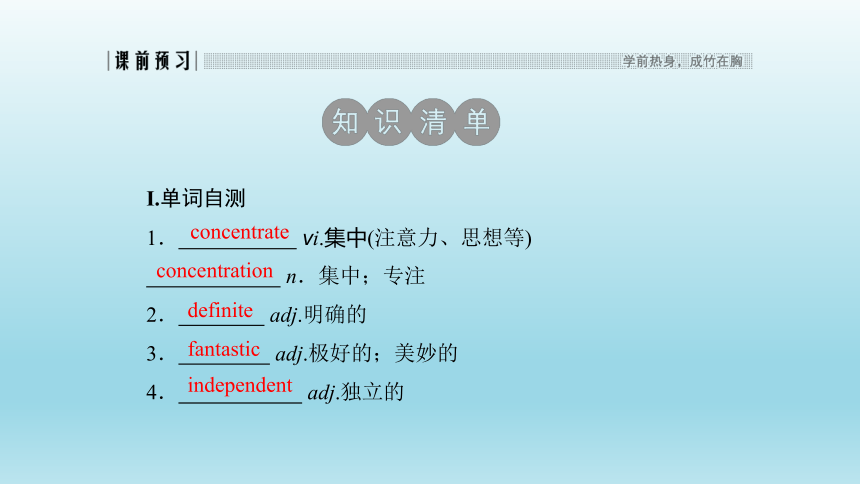
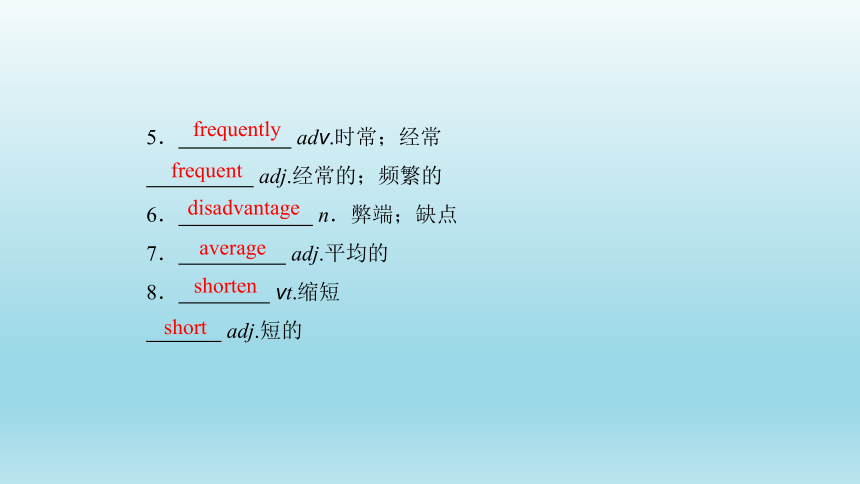
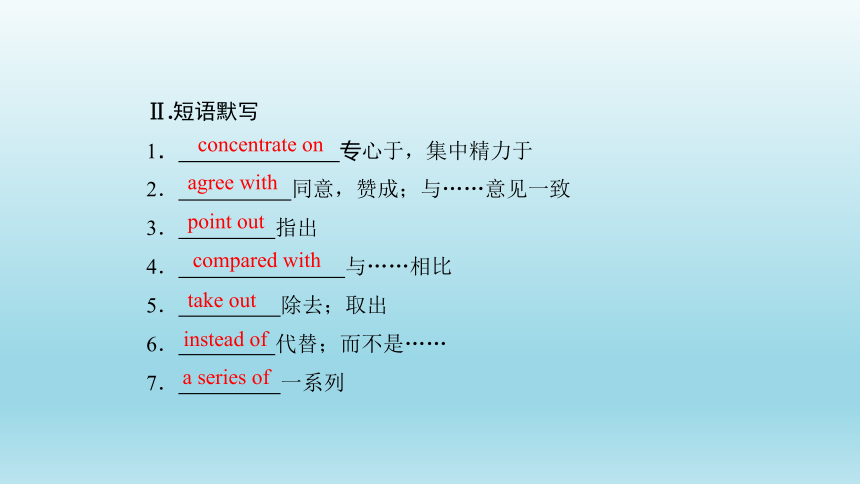
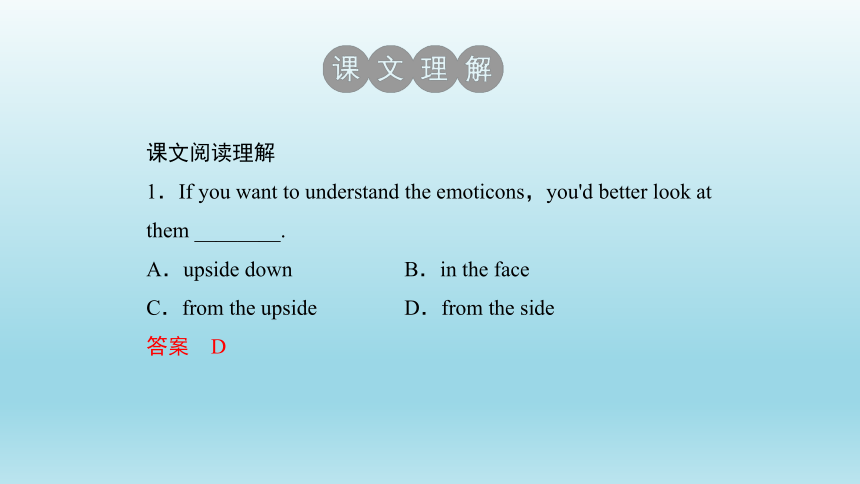
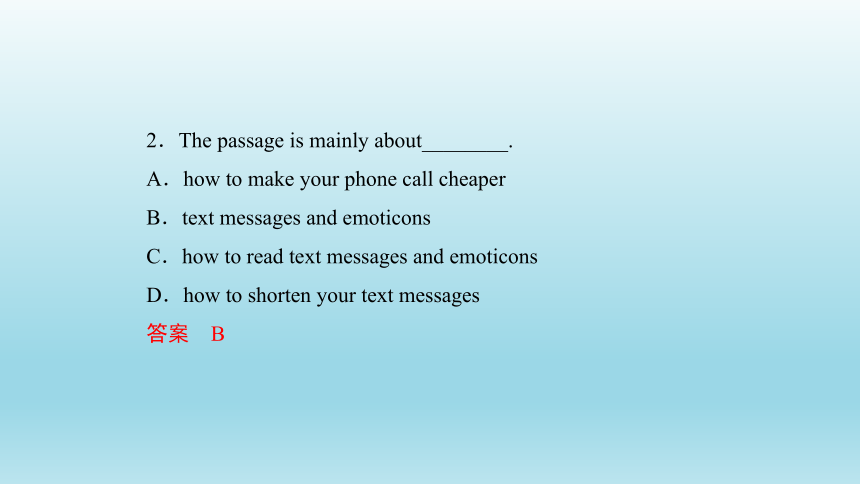
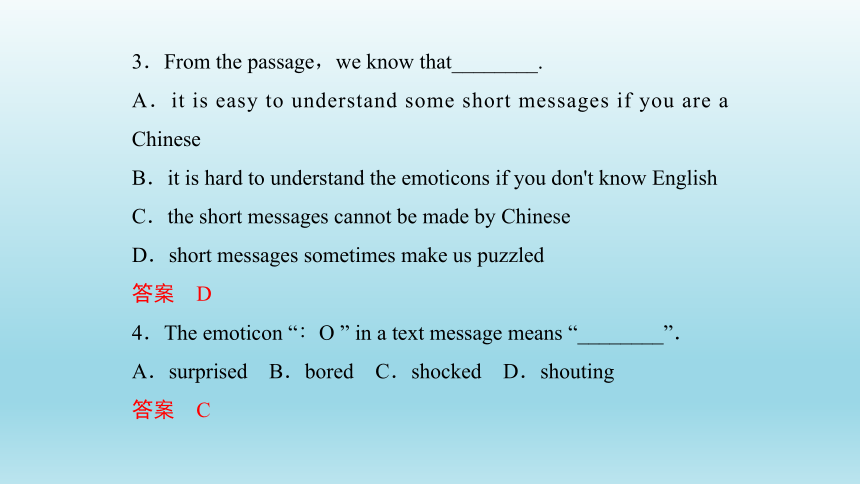
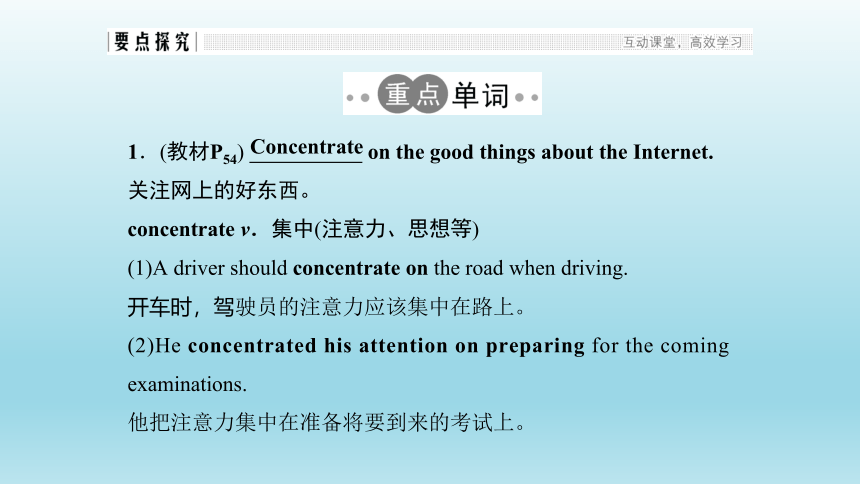
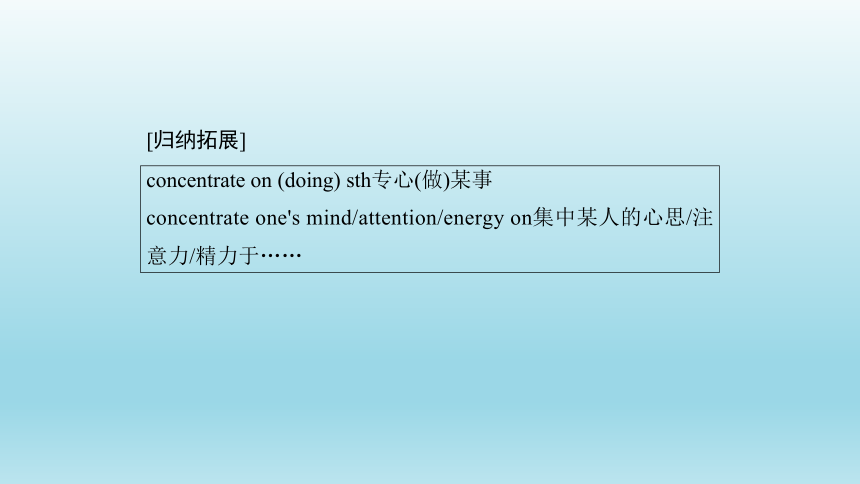
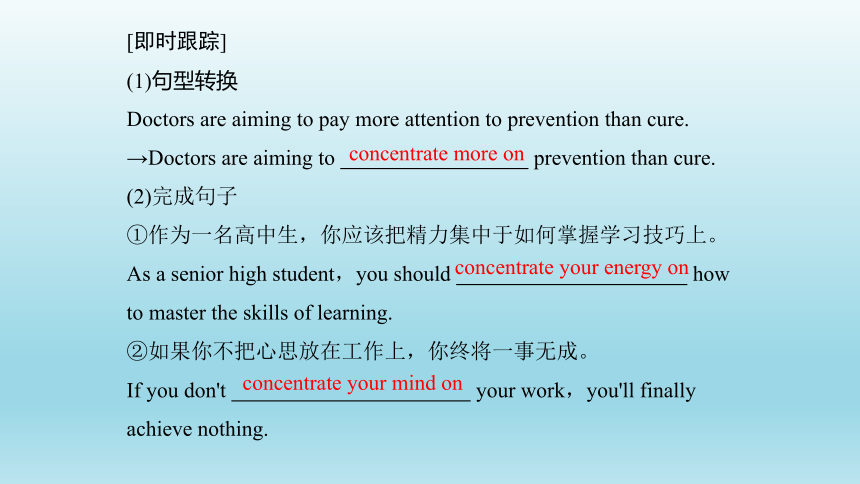
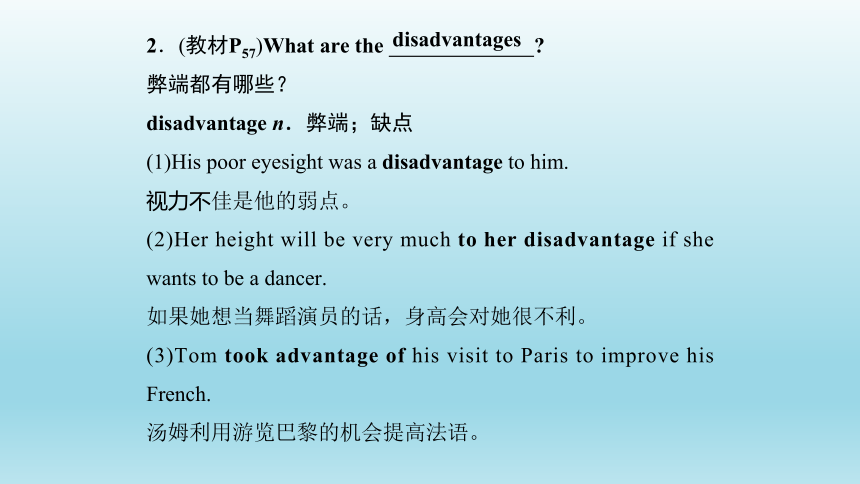
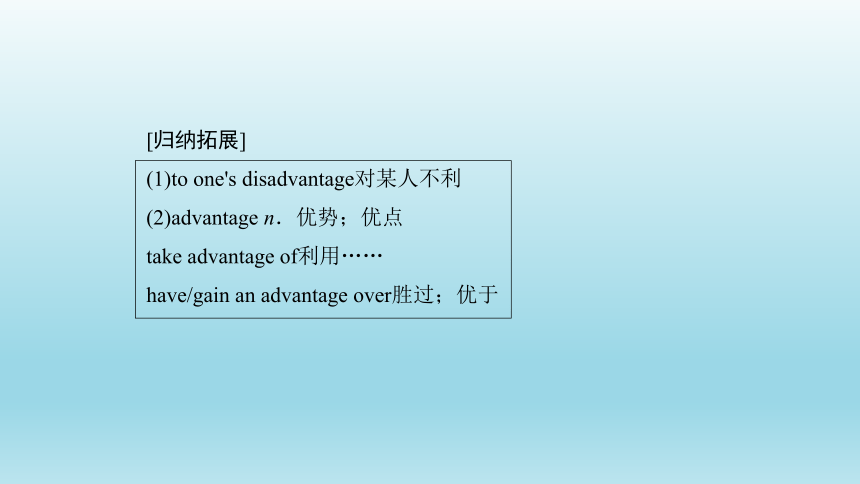
文档简介
(共33张PPT)
Period Two Integrating Skills &
Cultural Corner
Ⅰ.单词自测
1. vi.集中(注意力、思想等)
n.集中;专注
2. adj.明确的
3. adj.极好的;美妙的
4. adj.独立的
concentrate
concentration
definite
fantastic
independent
5. adv.时常;经常
adj.经常的;频繁的
6. n.弊端;缺点
7. adj.平均的
8. vt.缩短
adj.短的
frequently
frequent
disadvantage
average
shorten
short
Ⅱ.短语默写
1. 专心于,集中精力于
2. 同意,赞成;与……意见一致
3. 指出
4. 与……相比
5. 除去;取出
6. 代替;而不是……
7. 一系列
concentrate on
agree with
point out
compared with
take out
instead of
a series of
课文阅读理解
1.If you want to understand the emoticons,you'd better look at them ________.
A.upside down B.in the face
C.from the upside D.from the side
答案 D
2.The passage is mainly about________.
A.how to make your phone call cheaper
B.text messages and emoticons
C.how to read text messages and emoticons
D.how to shorten your text messages
答案 B
3.From the passage,we know that________.
A.it is easy to understand some short messages if you are a Chinese
B.it is hard to understand the emoticons if you don't know English
C.the short messages cannot be made by Chinese
D.short messages sometimes make us puzzled
答案 D
4.The emoticon “∶O ” in a text message means “________”.
A.surprised B.bored C.shocked D.shouting
答案 C
1.(教材P54) on the good things about the Internet.
关注网上的好东西。
concentrate v.集中(注意力、思想等)
(1)A driver should concentrate on the road when driving.
开车时,驾驶员的注意力应该集中在路上。
(2)He concentrated his attention on preparing for the coming examinations.
他把注意力集中在准备将要到来的考试上。
Concentrate
[归纳拓展]
concentrate on (doing) sth专心(做)某事
concentrate one's mind/attention/energy on集中某人的心思/注意力/精力于……
[即时跟踪]
(1)句型转换
Doctors are aiming to pay more attention to prevention than cure.
→Doctors are aiming to prevention than cure.
(2)完成句子
①作为一名高中生,你应该把精力集中于如何掌握学习技巧上。
As a senior high student,you should how
to master the skills of learning.
②如果你不把心思放在工作上,你终将一事无成。
If you don't your work,you'll finally
achieve nothing.
concentrate more on
concentrate your energy on
concentrate your mind on
2.(教材P57)What are the
弊端都有哪些?
disadvantage n.弊端;缺点
(1)His poor eyesight was a disadvantage to him.
视力不佳是他的弱点。
(2)Her height will be very much to her disadvantage if she wants to be a dancer.
如果她想当舞蹈演员的话,身高会对她很不利。
(3)Tom took advantage of his visit to Paris to improve his French.
汤姆利用游览巴黎的机会提高法语。
disadvantages
[归纳拓展]
(1)to one's disadvantage对某人不利
(2)advantage n.优势;优点
take advantage of利用……
have/gain an advantage over胜过;优于
[即时跟踪]
(1)他的化学比我学得好,但我的物理比他学得好。
He me in chemistry,but I
him in physics.
(2)她趁孩子不在时打扫了房间。
She the children's absence to clean the room.
(3)与金属相比较,塑料既有优点也有缺点。
Compared with metal,plastics have both
.
has an advantage over
gain an advantage over
took advantage of
advantages and disadvantages
3.(教材P57)The time the Chinese people spend
online is 17 hours per week.
中国人花在网上的时间是平均每周17小时。
average adj.平均的;普通的n.平均数;平均水平
(1)The average student spends about two or three hours a night doing homework.
普通学生每晚花两到三个小时做作业。
(2)On average,parents spend 110 a year on toys for their children.
通常,父母给孩子们买玩具的花费每年为110美元。
average
[即时跟踪]
(1)我们平均每天收到五封信。
we receive five letters each day.
(2)他的学业成绩在平均水平以下。
His work at school is .
(3)她弟弟的阅读能力在平均水平以上。
Her brother is in his reading ability.
(4)煤的产量每年平均增长20%。
The output of coal increases 20% every year.
On average
below average
above average
with an average of
1.(教材P56)I this idea,especially on the subject of
learning English.
我同意这个想法,尤其是在学习英语这门课程上。
agree with同意,赞成;与……一致;适合
(1)What has been reported on the TV does not quite agree with the fact.
在电视上报道的情况与事实不太一致。
(2)The climate here doesn't agree with me.
这里的气候不适合我。
(3)We don't agree on everything,of course.
当然,我们不是对所有事情的看法都一致。
agree with
[归纳拓展]
agree with one's idea/opinion/decision/view同意某人的想法/意见/决定/观点
agree to(to为介词)同意
agree to a plan/a proposal/an arrangement同意一项计划/提议/安排
agree on对……取得一致意见
agree to do sth同意做某事
[即时跟踪]
用适当的介词填空
(1)I don't agree everything you said.
(2)The two sides didn't agree when to carry out the plan.
(3)The boy agreed the arrangement.
(4)My father agreed buy a new pen for me.
with
on
to
to
2.(教材P57)Two percent of the total population of China have access to the Internet, 45 percent in the
USA and 15 percent in Japan.
与美国的45%和日本的15%相比,中国有2%的人能上网。
be compared with/to...和……比起来,与……相比
(1)Comparing his camera with mine,I find mine is better.
把他的照相机与我的相比较,我发现我的更好。
(2)He compared Beijing to the heart of China.
他把北京比作中国的心脏。
compared with
[即时跟踪]
(1)用适当的介词填空
①I agree your opinion.
②We agreed their arrangement.
③What he does does not agree what he says.
④Both sides agreed these terms.
⑤You look well.The air and the sea foods in Sanya must agree
you,I suppose.
with
to
with
on
with
(2)单句语法填空
I'm glad he agreed (take) my advice.Finally,he and I
agreed the time of the birthday party.
to take
on
1.部分否定
(教材P56)Our English teacher is excellent,but she help
in the class in 50 minutes.
我们英语老师很优秀,但她不能在50分钟内帮助班里的每个人。
can't
everyone
(1)All men here are not honest.
=Not all men here are honest.
这儿的人并非都很诚实。
(2)Everything didn't go well with me.
=Not everything went well with me.
我并非每件事都顺利。
(3)The rich men are not always happy.
有钱人并非总是幸福的。
[归纳拓展]
总括性代词、形容词或副词等和not连用时,表示半否定(也称部分否定)。这类总括性词有all,both,each或every,everyone,everything,everywhere,always,altogether,wholly等。
注意:对两者的全部否定用neither;对三者及其以上的全部否定用none,nobody,no one或nothing。
[即时跟踪]
(1)句型转换
Both of them like English.
→ (部
分否定)
→ (全部否定)
(2)翻译句子
①All is not gold that glitters.
闪光的未必都是金子。
②All the students have not read the novel Frog written by Mo Yan.
并非所有的学生都读过莫言的《蛙》。
Both of them don‘t like English./Not both of them like English.
Neither of them likes/like English.
2.动名词短语作主语
(教材P59) is expensive,so a lot of
people send text messages.
通过手机交谈太昂贵,所以很多人发短信。
(1)Reading aloud is a good way of learning languages.
大声朗读是学习语言的一个好方法。
(2)Wasting a person's time is the same as killing him for his property.
浪费别人的时间无异于谋财害命。
Talking on a mobile phone
[归纳拓展]
教材原句中动名词短语talking on a mobile phone作主语。
动名词(短语)作主语有以下几种常见情况:
(1)直接位于句首作主语。
(2)用it作形式主语,把动名词(真正主语)置于句尾。动名词作主语时,常见句型:It is useless/nice/good/worth/no use/no good/a waste of time+doing。
注意:动名词(短语)作主语时,谓语动词要用单数形式。
complaining
Working
is
Ignoring
Ⅰ.单句语法填空
1.Grandma is very (dependence) and does all her
own shopping and cooking.
2.They are planning further steps to (short) working
hours.
3.No matter how (frequent) praised,I always
remember never to stop improving myself.
4.She now works a nurse in a hospital.
5.It's an either or situation—we can buy a new car this year or
we can go on holiday but we can't do .
independent
shorten
frequently
as
both
1. last year,the output of the company has
increased by 20% in 2017.
2.You can six books at a time.
3.You should your study while you are at school.
4.I thought it was a good idea but he didn't me.
5.Can you the hotel on this map
Compared with
take out
concentrate on
agree with
point out
Ⅲ.完成句子
1.Anyone who can't (利用) network is at a
disadvantage.
2.It's useless (争辩这件事).
3.They want to (让公众清楚) that
they do an important job.
4.He (同意见面) on Sunday.
5. (并不是所有的孩子) like learning
English.
take advantage of
arguing about the matter
make it clear to the public
agreed to meet
Not all the children
Period Two Integrating Skills &
Cultural Corner
Ⅰ.单词自测
1. vi.集中(注意力、思想等)
n.集中;专注
2. adj.明确的
3. adj.极好的;美妙的
4. adj.独立的
concentrate
concentration
definite
fantastic
independent
5. adv.时常;经常
adj.经常的;频繁的
6. n.弊端;缺点
7. adj.平均的
8. vt.缩短
adj.短的
frequently
frequent
disadvantage
average
shorten
short
Ⅱ.短语默写
1. 专心于,集中精力于
2. 同意,赞成;与……意见一致
3. 指出
4. 与……相比
5. 除去;取出
6. 代替;而不是……
7. 一系列
concentrate on
agree with
point out
compared with
take out
instead of
a series of
课文阅读理解
1.If you want to understand the emoticons,you'd better look at them ________.
A.upside down B.in the face
C.from the upside D.from the side
答案 D
2.The passage is mainly about________.
A.how to make your phone call cheaper
B.text messages and emoticons
C.how to read text messages and emoticons
D.how to shorten your text messages
答案 B
3.From the passage,we know that________.
A.it is easy to understand some short messages if you are a Chinese
B.it is hard to understand the emoticons if you don't know English
C.the short messages cannot be made by Chinese
D.short messages sometimes make us puzzled
答案 D
4.The emoticon “∶O ” in a text message means “________”.
A.surprised B.bored C.shocked D.shouting
答案 C
1.(教材P54) on the good things about the Internet.
关注网上的好东西。
concentrate v.集中(注意力、思想等)
(1)A driver should concentrate on the road when driving.
开车时,驾驶员的注意力应该集中在路上。
(2)He concentrated his attention on preparing for the coming examinations.
他把注意力集中在准备将要到来的考试上。
Concentrate
[归纳拓展]
concentrate on (doing) sth专心(做)某事
concentrate one's mind/attention/energy on集中某人的心思/注意力/精力于……
[即时跟踪]
(1)句型转换
Doctors are aiming to pay more attention to prevention than cure.
→Doctors are aiming to prevention than cure.
(2)完成句子
①作为一名高中生,你应该把精力集中于如何掌握学习技巧上。
As a senior high student,you should how
to master the skills of learning.
②如果你不把心思放在工作上,你终将一事无成。
If you don't your work,you'll finally
achieve nothing.
concentrate more on
concentrate your energy on
concentrate your mind on
2.(教材P57)What are the
弊端都有哪些?
disadvantage n.弊端;缺点
(1)His poor eyesight was a disadvantage to him.
视力不佳是他的弱点。
(2)Her height will be very much to her disadvantage if she wants to be a dancer.
如果她想当舞蹈演员的话,身高会对她很不利。
(3)Tom took advantage of his visit to Paris to improve his French.
汤姆利用游览巴黎的机会提高法语。
disadvantages
[归纳拓展]
(1)to one's disadvantage对某人不利
(2)advantage n.优势;优点
take advantage of利用……
have/gain an advantage over胜过;优于
[即时跟踪]
(1)他的化学比我学得好,但我的物理比他学得好。
He me in chemistry,but I
him in physics.
(2)她趁孩子不在时打扫了房间。
She the children's absence to clean the room.
(3)与金属相比较,塑料既有优点也有缺点。
Compared with metal,plastics have both
.
has an advantage over
gain an advantage over
took advantage of
advantages and disadvantages
3.(教材P57)The time the Chinese people spend
online is 17 hours per week.
中国人花在网上的时间是平均每周17小时。
average adj.平均的;普通的n.平均数;平均水平
(1)The average student spends about two or three hours a night doing homework.
普通学生每晚花两到三个小时做作业。
(2)On average,parents spend 110 a year on toys for their children.
通常,父母给孩子们买玩具的花费每年为110美元。
average
[即时跟踪]
(1)我们平均每天收到五封信。
we receive five letters each day.
(2)他的学业成绩在平均水平以下。
His work at school is .
(3)她弟弟的阅读能力在平均水平以上。
Her brother is in his reading ability.
(4)煤的产量每年平均增长20%。
The output of coal increases 20% every year.
On average
below average
above average
with an average of
1.(教材P56)I this idea,especially on the subject of
learning English.
我同意这个想法,尤其是在学习英语这门课程上。
agree with同意,赞成;与……一致;适合
(1)What has been reported on the TV does not quite agree with the fact.
在电视上报道的情况与事实不太一致。
(2)The climate here doesn't agree with me.
这里的气候不适合我。
(3)We don't agree on everything,of course.
当然,我们不是对所有事情的看法都一致。
agree with
[归纳拓展]
agree with one's idea/opinion/decision/view同意某人的想法/意见/决定/观点
agree to(to为介词)同意
agree to a plan/a proposal/an arrangement同意一项计划/提议/安排
agree on对……取得一致意见
agree to do sth同意做某事
[即时跟踪]
用适当的介词填空
(1)I don't agree everything you said.
(2)The two sides didn't agree when to carry out the plan.
(3)The boy agreed the arrangement.
(4)My father agreed buy a new pen for me.
with
on
to
to
2.(教材P57)Two percent of the total population of China have access to the Internet, 45 percent in the
USA and 15 percent in Japan.
与美国的45%和日本的15%相比,中国有2%的人能上网。
be compared with/to...和……比起来,与……相比
(1)Comparing his camera with mine,I find mine is better.
把他的照相机与我的相比较,我发现我的更好。
(2)He compared Beijing to the heart of China.
他把北京比作中国的心脏。
compared with
[即时跟踪]
(1)用适当的介词填空
①I agree your opinion.
②We agreed their arrangement.
③What he does does not agree what he says.
④Both sides agreed these terms.
⑤You look well.The air and the sea foods in Sanya must agree
you,I suppose.
with
to
with
on
with
(2)单句语法填空
I'm glad he agreed (take) my advice.Finally,he and I
agreed the time of the birthday party.
to take
on
1.部分否定
(教材P56)Our English teacher is excellent,but she help
in the class in 50 minutes.
我们英语老师很优秀,但她不能在50分钟内帮助班里的每个人。
can't
everyone
(1)All men here are not honest.
=Not all men here are honest.
这儿的人并非都很诚实。
(2)Everything didn't go well with me.
=Not everything went well with me.
我并非每件事都顺利。
(3)The rich men are not always happy.
有钱人并非总是幸福的。
[归纳拓展]
总括性代词、形容词或副词等和not连用时,表示半否定(也称部分否定)。这类总括性词有all,both,each或every,everyone,everything,everywhere,always,altogether,wholly等。
注意:对两者的全部否定用neither;对三者及其以上的全部否定用none,nobody,no one或nothing。
[即时跟踪]
(1)句型转换
Both of them like English.
→ (部
分否定)
→ (全部否定)
(2)翻译句子
①All is not gold that glitters.
闪光的未必都是金子。
②All the students have not read the novel Frog written by Mo Yan.
并非所有的学生都读过莫言的《蛙》。
Both of them don‘t like English./Not both of them like English.
Neither of them likes/like English.
2.动名词短语作主语
(教材P59) is expensive,so a lot of
people send text messages.
通过手机交谈太昂贵,所以很多人发短信。
(1)Reading aloud is a good way of learning languages.
大声朗读是学习语言的一个好方法。
(2)Wasting a person's time is the same as killing him for his property.
浪费别人的时间无异于谋财害命。
Talking on a mobile phone
[归纳拓展]
教材原句中动名词短语talking on a mobile phone作主语。
动名词(短语)作主语有以下几种常见情况:
(1)直接位于句首作主语。
(2)用it作形式主语,把动名词(真正主语)置于句尾。动名词作主语时,常见句型:It is useless/nice/good/worth/no use/no good/a waste of time+doing。
注意:动名词(短语)作主语时,谓语动词要用单数形式。
complaining
Working
is
Ignoring
Ⅰ.单句语法填空
1.Grandma is very (dependence) and does all her
own shopping and cooking.
2.They are planning further steps to (short) working
hours.
3.No matter how (frequent) praised,I always
remember never to stop improving myself.
4.She now works a nurse in a hospital.
5.It's an either or situation—we can buy a new car this year or
we can go on holiday but we can't do .
independent
shorten
frequently
as
both
1. last year,the output of the company has
increased by 20% in 2017.
2.You can six books at a time.
3.You should your study while you are at school.
4.I thought it was a good idea but he didn't me.
5.Can you the hotel on this map
Compared with
take out
concentrate on
agree with
point out
Ⅲ.完成句子
1.Anyone who can't (利用) network is at a
disadvantage.
2.It's useless (争辩这件事).
3.They want to (让公众清楚) that
they do an important job.
4.He (同意见面) on Sunday.
5. (并不是所有的孩子) like learning
English.
take advantage of
arguing about the matter
make it clear to the public
agreed to meet
Not all the children
